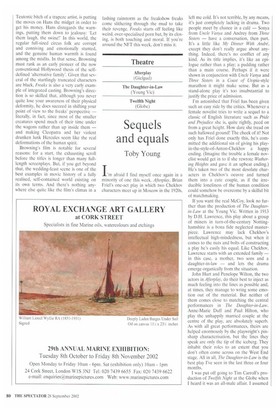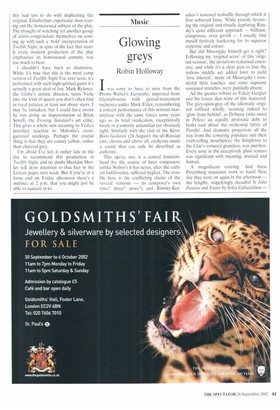Sequels and equals
Toby Young
I'm afraid I find myself once again in a minority of one this week. Afterplay. Brian Friel's one-act play in which two Chekhov characters meet up in Moscow in the 1920s,
left me cold. It's not terrible, by any means, it's just completely lacking in drama. Two people meet by chance in a café — Sonya from Uncle Vanya and Andrey from Three Sisters — have a conversation, then part. It's a little like My Dinner With Andre, except they don't really argue about anything. Indeed, there's no conflict of any kind. As its title implies, it's like an epilogue rather than a play; a pudding rather than a main course. Perhaps if it were shown in conjunction with Uncle Vanya and Three Sisters in a Coast of Utopia-style marathon it might make sense. But as a stand-alone play it's too insubstantial to justify the price of admission.
I'm astonished that Friel has been given such an easy ride by the critics. Whenever a female novelist tries to write a sequel to a classic of English literature such as Pride and Prejudice she is, quite rightly, peed on from a great height. How dare she tread on such hallowed ground! The cheek of it! Not only has Friel done exactly this, he's committed the additional sin of giving his playin-the-style-of-Anton-Chekhov a happy ending. (Imagine the trouble a female novelist would get in to if she rewrote Wuthering Heights and gave it an upbeat ending.) He's taken two of the most desolate characters in Chekhov's oeuvre and turned them into a cute couple, as if the irreducible loneliness of the human condition could somehow be overcome by a skilful bit of matchmaking.
If you want the real McCoy, look no further than the production of The Daughterin-Law at the Young Vic. Written in 1913 by D.H. Lawrence, this play about a group of miners in turn-of-the-century Nottinghamshire is a bona fide neglected masterpiece. Lawrence may lack Chekhov's intellectual high-mindedness, but when it comes to the nuts and bolts of constructing a play he's easily his equal. Like Chekhov, Lawrence starts with an extended family — in this case, a mother, two sons and a daughter-in-law — and lets the drama emerge organically from the situation.
John Hurt and Penelope Wilton, the two actors in Afterplay, do their best to inject as much feeling into the lines as possible and, at times, they manage to wring some emotion out of the material. But neither of them comes close to matching the central performances in The Daughter-in-Law. Anne-Marie Duff and Paul Hilton, who play the unhappily married couple at the centre of the play, are absolutely superb. As with all great performances, theirs are helped enormously by the playwright's pinsharp characterisation, but the lines they speak are only the tip of the iceberg. They inhabit their roles to an extent that you don't often come across on the West End stage. All in all, The Daughter-in-Law is the best play I've seen in the last three or four months.
I was put off going to Tim Carroll's production of Twelfth Night at the Globe when I heard it was an all-male affair. I assumed this had less to do with duplicating the original. Elizabethan experience than teasing out the homosexual subtext of the play. The thought of watching yet another group of actors congratulate themselves on coming up with such a 'bold' interpretation of Twelfth Night, in spite of the fact that nearly every modern production of the play emphasises its homosexual content, was too much to bear.
I shouldn't have been so dismissive. While it's true that this is the most camp version of Twelfth Night I've ever seen, it's performed with such high-spirited gusto it's actually a great deal of fun. Mark Rylance, the Globe's artistic director, turns Viola into the kind of queen you don't often find in royal palaces, at least not above stairs. I may be mistaken, but I could have sworn he was doing an impersonation of Brian Sewell, the Evening Standard's art critic. This gives a whole new meaning to Viola's horrified reaction to Malvolio's crossgartered stockings. Perhaps the crucial thing is that they are canary yellow, rather than charcoal grey.
I'm afraid I've left it rather late in the day to recommend this production of Twelfth Night, and no doubt Sheridan Morley will draw attention to that fact in the Letters pages next week. But if you're at a loose end on Friday afternoon there's a matinee at 2 p.m. that you might just be able to squeeze in to.



































































































 Previous page
Previous page